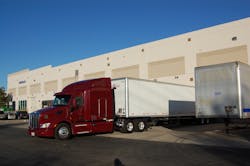Lots of change may be on the menu for trucking in 2017 as economic trends and federal policy efforts could make further alterations to the U.S. freight market – everything from canceling regulations to the adoption of new strategies for meeting customer demands.
“When you move 70% of the nation’s domestic freight there are few issues out there that we are not a part of either directly or indirectly,” Chris Spear, president and CEO of the American Trucking Associations (ATA) trade group, explained in a recent phone interview with me. “Tax reform, trade, and infrastructure: we have a role to play in all of those issues.”
For starters, he noted that the 10-year $1 trillion infrastructure proposal put on the table by President-elect Trump could be a big positive for the industry in a number of ways.
“Infrastructure is our industry’s lifeblood: We need good infrastructure and getting such a package passed is key right out of the gate,” Spear said. “At least as proposed, that package will likely be tied to tax reform.”
Trade is another really pivotal issue in Spear’s view, as over 76% of NAFTA surface trade is carried by trucks. “Again, we have to help shape whatever trade proposals will look like,” he noted.
When it comes to regulation, though, you can boil Spear’s view down to two words: “it depends.”
“We’re not afraid of regulations – we’re a very heavily regulated industry. But what we want are good, clear regulations that we can comply with without undue burden and a measurable return,” he explained.
“Look at the Phase 2 greenhouse gas [GHG] rules: they will define future efficiency for our industry and offer a measurable return for our investments. This is a win-win for us and the environment,” Spear said.
“But where regulations don’t work, we’ll oppose them. For example, the speed limiter rule we will oppose [because] it’s completely flawed approach.”
In the end, he stressed, it “all really comes down to good give and take between industry and the regulators.”
Sandeep Kar, global vice president for mobility at Frost & Sullivan, added that few industries will face the impact — whether net positive or negative — of a Trump presidency as strongly as trucking, which is a leading indicator of economic activity and typically feels the effects of economic swings and fluctuations well before many other industries or sectors.
“While the effect of Trump administration’s legislative actions will be experienced primarily by the U.S. commercial vehicle industry, global market participants and markets will have much to note and consider,” he noted in a recent report.
“Most presidential transitions include reasonable certainties regarding upcoming policy priorities and changes that enable nations, markets, and industries to prepare for their impact,” Kar said. “Over the past several decades, proposed policy changes generally have had narrow boundaries. This time it is different, and it is going to be more different for trucking than ever before.”
He added that Trump’s publicly stated stand on lowering corporate taxes will definitely have cascading effects on all aspects of U.S. and global industries.
“Lower corporate taxes would likely result in businesses considering either establishing or reshoring US operations,” Kar explained. “While on the surface this would appear to be great news for the U.S. trucking industry, it may not be as great for either U.S. or global truck manufacturers and suppliers. Lower corporate taxes will most likely drive service-based businesses to the U.S., which would be of less benefit to freight movement than a move of manufacturing operations.”
Another concern: Labor costs could spike as lower corporate taxes could drive inflation, resulting in wage hikes which would render the incentive of lower taxes much less effective.
Moreover, Kar thinks the U.S. and many other economies are still “unstable,” with many nations skating dangerously close to “recessionary boundaries.”
Thus economic and trade policy changes could induce short-term recessionary spasms before a clearer and stable picture emerges, he said.
Where trade is concerned, modifications or rejections of trade treaties such as the North American Free Trade Agreement (NAFTA) or the Trans-Pacific Partnership (TPP) could adversely impact U.S. truck OEMs and their suppliers as many manufacture and/or source materials from Mexico.
However, there may be a “silver lining” from that as well, Kar emphasized.
“Several Asian OEMs in recent years have secured strong positions in light- and medium-duty truck markets [and] new trade policies could hurt them, forcing more U.S. localization and higher taxation for market access — both of which will favor U.S.-based OEMs,” he explained.
Another positive: expedited infrastructure refurbishment and/or enhancement projects and public-private partnerships focused on improving U.S. highways and freight movement infrastructure could have a net positive impact on freight and vehicle efficiencies, route congestion, and sales of off-highway vehicles if the administration implements many such projects immediately.
“[But] this could prove difficult because funding [needs] could trigger higher taxes – and Trump has stated his opposition to increase the deficit to pay for his infrastructure plans,” Kar noted.
Roei Ganzarski, a former Boeing executive and now CEO of BoldIQ, which provides optimization software for asset scheduling, added another economic twist to trucking’s outlook where the economy is concerned: the rise of “demand-driven” freight transportation service.
“Consumers or customers want to get what they want, at the time and place they want it, and only want to ask for it [delivery service] when they are ready to ask and not before,” he explained to me recently. “Thus the transportation operator must be ‘demand-driven’ in order to serve such on-demand needs in an efficient manner that enables scale, growth, and profitability.”
That “on-demand economy” is also shortening planning cycles and significantly shortening decision making time frames. “This means the need for intelligent, data driven, and real-time decision making is critical,” especially in trucking, Ganzarski said.
He added that this “demand-driven” view assumes that trucking companies and other freight service providers have finite resources to do their work.
“This must be viewed differently from the so-called ‘sharing economy’ where an operation will use someone else’s resources because they are so inefficient, they have spare time or capacity on their resources,” Ganzarski pointed out.
That will lead to more consolidation and even elimination of some transport companies that cannot adapt fast enough to the change, he said.
I’ll tell you one thing: all of that adds up to what will no doubt be a very busy 2017 for motor carriers, on a whole range of fronts. Better load up on the coffee!



